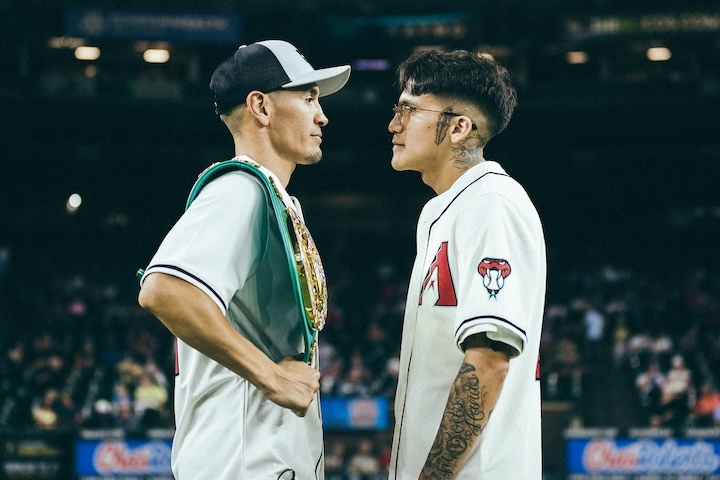PHOENIX – It’s a battle for turf, both on the pound-for-pound scale and on a map that defines home and heart.
Jesse “Bam” Rodriguez has already staked his claim. For the second straight time, he’s back in a city known for its unique appreciation of the smallest weight classes, perhaps because it’s also home to a Hall of Fame junior flyweight, Michael Carbajal, the first to generate heavyweight headlines and money for the little guys.
Saturday night, Rodriguez, a young Mexican-American from San Antonio, will return, this time to Footprint Center, a downtown NBA arena located just a few blocks from a street that in May was re-named after Carbajal.
Carbajal helped open the Suns’ home back in 1992. “Bam” hopes to leave some of his own flyweight footprints there against Juan Francisco Estrada at 115 pounds, called junior bantamweight by some of the acronym organizations. But that’s a little bit like calling the Super Bowl just another football game.
Only “SuperFly” fits this one.
An ordinary tale of the tape doesn’t account for off-the-scale expectations. It also doesn’t explain how Rodriguez and Estrada, fighters from different generations, arrived here at the right time and the right place at a significant crossroads for a chance at some more history.
Increasingly, the Bam story is being told. Already the best American in the lightest weights since Carbajal, he faces Estrada in a bid to embellish his pound-for-pound credentials.
His battering, ninth-round stoppage of U.K. flyweight Sunny Edwards at Desert Diamond Arena in suburban Glendale last December vaulted him into the bottom of the pound-for-pound ratings.
It’s no coincidence that Edwards, booed at opening bell for his trash talk and cheered in the end for his gutsy performance at Desert Diamond, will also return to Phoenix for his first bout since the crushing loss on Saturday’s undercard against ex-titlist Adrian Curiel.
Somewhat lost in all of this, however, is the compelling story of Estrada.
Like Rodriguez and Edwards, Estrada is also making his second straight appearance in Phoenix.
In a memorable masterpiece of tactical skill and poise, he scored a majority decision over little-guy legend Roman “Chocolatito” Gonzalez at Desert Diamond in a trilogy fight in December 2022.
He has been idle ever since, which raises some reasonable questions about whether ring rust will damage the 34-year-old’s chances against the aggressive and busy Rodriguez, a decade younger at 24.
But Estrada says he’s ready.
“I’ve been in the gym the whole time,’’ he said. “It’s not like I haven’t continued to work. We thought maybe we’d fight [fellow junior bantamweight titleholder] Kazuto Ioka, but we’ve really wanted to fight Bam. The opportunity was there. Bam has been the one I’ve wanted to fight for awhile.’’
Rodriguez, who beat Carlos Cuadras at Footprint in February 2022, is turning Phoenix into his second home. Yet there’s a pretty good argument that Estrada is more at home than Bam or anybody else on Matchroom’s Phoenix (DAZN) card.
Just take a look at a map.
Estrada was born about 215 miles south of the ring he’ll step into Saturday night.
He spent the first years of his life in a fishing town called Puerto Penasco at the top of the Gulf of California. The place is well known in Phoenix, where gringos call it Rocky Point. It’s Arizona’s closest beach, known for stark beauty created by sweeping desert dunes alongside bright blue waters full of shrimp.
It’s remote. It’s a tough place to grow up, a place of extreme contrasts that perhaps forged Estrada into the quiet, disciplined fighter he’s known to be.
He was born into a fisherman’s family and might have been one himself if not for tragedies that robbed him of his parents when he was only 7 years old.
First, his mom died of leukemia.
Then, his dad died in an accident.
“Like so many, he fished for a living,’’ Estrada said. “He died fishing.’’
His father, Estrada said, died while diving to retrieve and repair equipment.
“His scuba tanks failed,’’ he said.
For the 7-year-old Estrada, that meant years of living with aunts, uncles and cousins. Mostly, he fought the grief and fought for a way to make a living in the ring instead of fishing. He moved to Culiacan and then Hermosillo.
“I was 15 when I went to Hermosillo,’’ Estrada recalled through an interpreter. ‘I would see family and siblings there and would say to myself, ‘Well, I have no parents. I have to give it everything to become someone in life.’”
Estrada says he has family and friends who are still fishing the rich waters off Puerto Penasco.
He says he’s not sure how many will be able to make the trip north across the border and the Sonoran desert to Phoenix. But some, he says, are sure to be there to see a celebrated son of a fisherman still in a fight to be someone.
And more.
